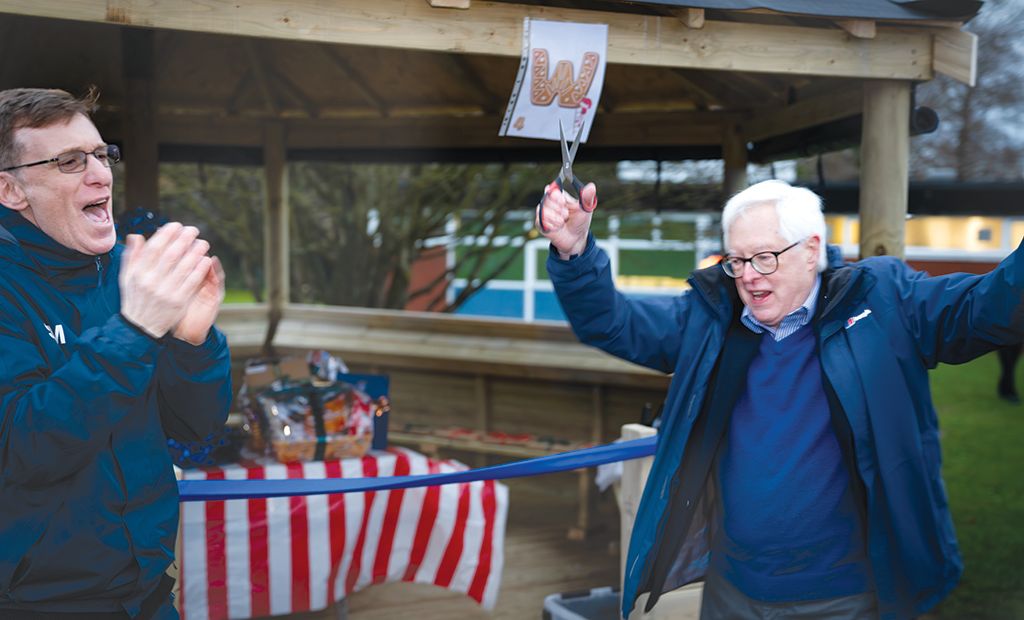Three years ago, Surrey County Council established a substantial fund to be shared among local organisations such as schools, charities and community groups. We called it Your Fund Surrey (YFS). The money was intended for major capital expenditure. Our aim was to fund large-scale, long-term projects that would positively impact the lives of people using them today and for many years to come. Each of the 81 local councillors had £100,000 to distribute in their area.
YFS is split between two funds: the Small Community Projects fund, which supports projects requiring between £1,000and £100,000, and the Large Community Projects fund, which provides awards of £10,000 and above. Since 2020, the council has supported 47 projects across Surrey with £22 million.
Personally, I was proud to cut the ribbon on a new outdoor classroom at Warren Mead Infant and Junior School, which is in my area. The classroom was partly funded by the YFS Small Community Fund. This award doesn’t come from an anonymous body; it is always accommodated through a local councillor who acts as the gatekeeper. Typically, we councillors would already have established a good relationship with the schools in our area and have an understanding of their plans. That relationship is frankly the most important thing and is the ideal way to begin the application process.
Sometimes, PTAs email me to ask if there’s any funding left. I can then indicate whether their proposed project is suitable. We also look to see what funding the PTA are putting in themselves or if some money is coming from other donors, as we want it to go as far as possible. It’s not essential, but it helps get things across the line. Although our Small Community Projects fund recently ended, the final deadline for the Large Community Projects fund is November 2025, and we are treating applications on a first-come, first-served basis. PTAs and schools in our area can also apply to our Revenue Grants fund, which has been awarding grants from a few hundred pounds up to £5,000 for the past 30 years.
Previously funded projects
- YFS awarded £23,150 to Esher Church of England High School to repave and add bedding plants to an outdoor area used by staff and students. The site was previously covered with uneven concrete slabs, creating a trip hazard.
- Park Mead Primary School in Cranleigh, Surrey, received £100,000 from YFS plus a further £100,000 from the Community Infrastructure Levy to build a multi-use games arena.
- Cranmere Primary School received a grant of £18,380 to resurface their Early Years play area.
Grant success
‘We gave an old garage a new purpose’
The Friends of Manby Lodge worked with the school to transform an old, dilapidated garage, which was infested with damp, into a useable space. They did this through a combination of grants and fundraising, including applying to the YFS Small Community Projects fund.
The refurbished space is now a self-contained classroom with full disabled access, a toilet and a kitchen. After school hours it is used for clubs and the school also hires it out to organisations, community groups and private individuals.
‘We received £67,000 from the CIL Community Infrastructure grant; £2,400 from the YFS Small Community Projects fund and£21,000 from the Friends of Manby Lodge,’ says school business manager Helen Plummer. ‘It took a year to get planning permission and it’s been a labour of love, but we are really delighted with it.’
Manby Lodge Primary School, Weybridge, Surrey (270 pupils)
- Meet the funder: Morrisons Foundation
- Meet the funder: South Downs National Park Authority
- Meet the funder: The Nineveh Charitable Trust
- Meet the funder: Movement for Good
‘Our outdoor classroom is a hit’
Warren Mead Parents and Friends Association (WMPFA) received £12,342 from the YFS Small Community Projects fund to help build an outdoor classroom. ‘We wanted an extension of the traditional classroom, to allow our pupils to engage in interactive, hands-on learning activities in a natural environment because it’s so good for their education and wellbeing,’ says WMPFA’s Katie McVea.
At the same time, the school started a project to revitalise an unused outdoor area on their site, known as the Quad. After volunteers prepared the ground, the area now has a refurbished pond with newts, outdoor seating and a gardening area with a fruit and vegetable patch. Works to the Quad were funded by GLF Schools, the Academy under which the school operates, and the Warren Mead Parent and Friends Association.
The PFA was delighted to receive £1,750 in grant funding from Toyota and a further £500 from the Shanly Foundation, a property company. In addition, they secured £1,000 worth of free gardening equipment from Westland Horticulture, following the launch of their New Horizons initiative, which aims to nurture projects that enhance green spaces.
‘We have a really good team at the PFA,’ says Katie. ‘This new and renovated environment encourages exploration and creativity outside the confines of conventional classrooms.’
Warren Mead Infant and Junior School Partnership, Banstead, Surrey (451 pupils across the two schools)
What is the difference between the types of council grants?
Claire Welburn, partner at Welburn & Wood Fundraising Solutions says:
‘Available funding is different in every area and changes regularly. If you are hoping to attract this kind of funding, my main advice is to engage the councillors in your parish, town or county.
Sources of funding from councils include Ward Funding, Community Infrastructure Levy (CIL), Section 106 (S106) and Community Funds.
CIL and S106 are linked to local developments: S106 funds are negotiated by the council during the planning stage of each development and are specifically intended to mitigate the impact of that development. In contrast, CIL is a fixed charge applied per square metre of development. A portion of these funds (often 15-20%) may be allocated to Town or Parish councils. While these funds can sometimes benefit schools, their primary purpose is to support key infrastructure projects and community initiatives, so your project may need to provide benefits beyond just the children at your school.
Ward Funding and Community Funds are set aside by the Council to support local groups. These funds are often tied to specific themes, such as environmental objectives, and are designed to benefit the community rather than solely the children at any particular school.’






